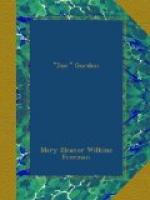Gordon thought he heard footsteps, and the man made a very slight motion. Gordon thought joyfully that Aaron had left the balky mare, and had returned, but it was not so. He had heard nothing except the pulsations of the blood in his own overwrought brain.
He wondered if he were really going mad, although all the time his mind was steadily at work upon the awful problem which had been forced upon it. Should any power for evil be allowed to exist upon the earth if mortal man had strength to stamp it out? Suppose that was a poisonous snake out there, and not a man. What was out there was worse than any snake. Gordon reasoned as the first man in Eden may have reasoned; and he did not know whether his reasoning were right or wrong. Meantime, the danger increased every moment. Of one thing he was perfectly sure: he had no personal motive for what he might or might not do. He had reached that pass when he was himself, as far as he himself was concerned, beyond hate of that man outside. It was a principle for which he argued. Should a monster, something abnormal in strength and subtlety and wickedness, something which menaced all the good in the world, be allowed to exist? Gordon argued that it should not. He was driven to it by years of fruitless struggling against this monstrous creation in the shape of man. He had seen such suffering because of him; his whole life had been so turned and twisted this way and that way because of him, that he himself had in the end become abnormal, and mentally askew, with the system of things. He was conscious of it himself. He had been naturally a good, simple, broad-visioned man, full of charity, with almost no subtlety. He had been forced to lead a life which strained and diverted all these good traits. Where he would have been open, he had been secret. Where he would have had no suspicion of any one, his first sight now seemed to be for ulterior motives. He weighed and measured where he naturally would have scattered broadcast. He had been obliged to compress his broad vision into a narrow window of detection. He was not the man he had been. Where he had gazed out of wide doors and windows at life, he now gazed through keyholes, and despised himself for so doing. In order to evade the trouble which had fallen to his lot, he took refuge in another personality. Thomas Gordon was a man whom a happy and untroubled life would have kept from all worldly blemish. Now the gold was tarnished, and he himself always saw the tarnish, as one sees a blur before the eye. Twenty years before, if any one had told him that he would at any period of his life become capable of standing and arguing with himself as to the right or wrong of what was now in his mind, he would have been incredulous. He had in reality become another man. Circumstances had evolved him, during the course of twenty years, into something different, as persistent winds evolve a pliant tree into another than its typical shape. Gordon had lost his type.




